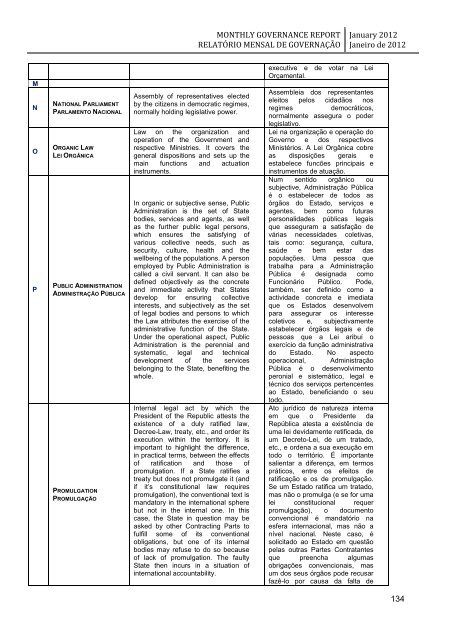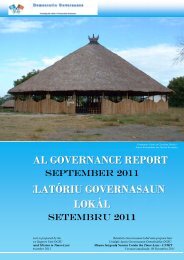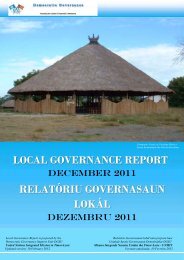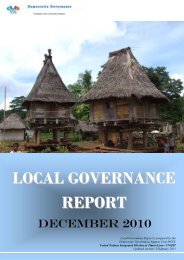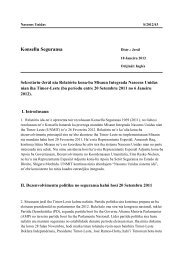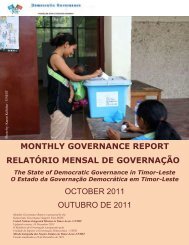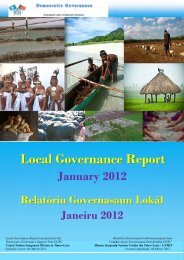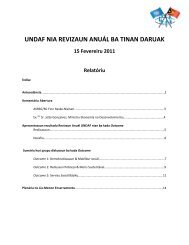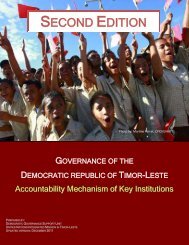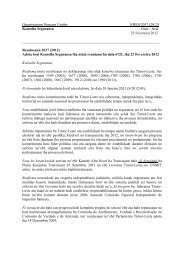monthly governance report relatório mensal de governação - Unmit
monthly governance report relatório mensal de governação - Unmit
monthly governance report relatório mensal de governação - Unmit
You also want an ePaper? Increase the reach of your titles
YUMPU automatically turns print PDFs into web optimized ePapers that Google loves.
M<br />
N<br />
O<br />
P<br />
NATIONAL PARLIAMENT<br />
PARLAMENTO NACIONAL<br />
ORGANIC LAW<br />
LEI ORGÂNICA<br />
PUBLIC ADMINISTRATION<br />
ADMINISTRAÇÃO PÚBLICA<br />
PROMULGATION<br />
PROMULGAÇÃO<br />
Assembly of representatives elected<br />
by the citizens in <strong>de</strong>mocratic regimes,<br />
normally holding legislative power.<br />
Law on the organization and<br />
operation of the Government and<br />
respective Ministries. It covers the<br />
general dispositions and sets up the<br />
main functions and actuation<br />
instruments.<br />
In organic or subjective sense, Public<br />
Administration is the set of State<br />
bodies, services and agents, as well<br />
as the further public legal persons,<br />
which ensures the satisfying of<br />
various collective needs, such as<br />
security, culture, health and the<br />
wellbeing of the populations. A person<br />
employed by Public Administration is<br />
called a civil servant. It can also be<br />
<strong>de</strong>fined objectively as the concrete<br />
and immediate activity that States<br />
<strong>de</strong>velop for ensuring collective<br />
interests, and subjectively as the set<br />
of legal bodies and persons to which<br />
the Law attributes the exercise of the<br />
administrative function of the State.<br />
Un<strong>de</strong>r the operational aspect, Public<br />
Administration is the perennial and<br />
systematic, legal and technical<br />
<strong>de</strong>velopment of the services<br />
belonging to the State, benefiting the<br />
whole.<br />
Internal legal act by which the<br />
Presi<strong>de</strong>nt of the Republic attests the<br />
existence of a duly ratified law,<br />
Decree-Law, treaty, etc., and or<strong>de</strong>r its<br />
execution within the territory. It is<br />
important to highlight the difference,<br />
in practical terms, between the effects<br />
of ratification and those of<br />
promulgation. If a State ratifies a<br />
treaty but does not promulgate it (and<br />
if it‘s constitutional law requires<br />
promulgation), the conventional text is<br />
mandatory in the international sphere<br />
but not in the internal one. In this<br />
case, the State in question may be<br />
asked by other Contracting Parts to<br />
fulfill some of its conventional<br />
obligations, but one of its internal<br />
bodies may refuse to do so because<br />
of lack of promulgation. The faulty<br />
State then incurs in a situation of<br />
international accountability.<br />
MONTHLY GOVERNANCE REPORT<br />
RELATÓRIO MENSAL DE GOVERNAÇÃO<br />
executive e <strong>de</strong> votar na Lei<br />
Orçamental.<br />
Assembleia dos representantes<br />
eleitos pelos cidadãos nos<br />
regimes <strong>de</strong>mocráticos,<br />
normalmente assegura o po<strong>de</strong>r<br />
legislativo.<br />
Lei na organização e operação do<br />
Governo e dos respectivos<br />
Ministérios. A Lei Orgânica cobre<br />
as disposições gerais e<br />
estabelece funcões principais e<br />
instrumentos <strong>de</strong> atuação.<br />
Num sentido orgânico ou<br />
subjective, Administração Pública<br />
é o estabelecer <strong>de</strong> todos as<br />
órgãos do Estado, serviços e<br />
agentes, bem como futuras<br />
personalida<strong>de</strong>s públicas legais<br />
que asseguram a satisfação <strong>de</strong><br />
várias necessida<strong>de</strong>s coletivas,<br />
tais como: segurança, cultura,<br />
saú<strong>de</strong> e bem estar das<br />
populações. Uma pessoa que<br />
trabalha para a Administração<br />
Pública é <strong>de</strong>signada como<br />
Funcionário Público. Po<strong>de</strong>,<br />
também, ser <strong>de</strong>finido como a<br />
activida<strong>de</strong> concreta e imediata<br />
que os Estados <strong>de</strong>senvolvem<br />
para assegurar os interesse<br />
coletivos e, subjectivamente<br />
estabelecer órgãos legais e <strong>de</strong><br />
pessoas que a Lei aribuí o<br />
exercício da função administrativa<br />
do Estado. No aspecto<br />
operacional, Administração<br />
Pública é o <strong>de</strong>senvolvimento<br />
peronial e sistemático, legal e<br />
técnico dos serviços pertencentes<br />
ao Estado, beneficiando o seu<br />
todo.<br />
Ato jurídico <strong>de</strong> natureza interna<br />
em que o Presi<strong>de</strong>nte da<br />
República atesta a existência <strong>de</strong><br />
uma lei <strong>de</strong>vidamente retificada, <strong>de</strong><br />
um Decreto-Lei, <strong>de</strong> um tratado,<br />
etc., e or<strong>de</strong>na a sua execução em<br />
todo o território. É importante<br />
salientar a diferença, em termos<br />
práticos, entre os efeitos <strong>de</strong><br />
ratificação e os <strong>de</strong> promulgação.<br />
Se um Estado ratifica um tratado,<br />
mas não o promulga (e se for uma<br />
lei constitucional requer<br />
promulgação), o documento<br />
convencional é mandatório na<br />
esfera internacional, mas não a<br />
nível nacional. Neste caso, é<br />
solicitado ao Estado em questão<br />
pelas outras Partes Contratantes<br />
que preencha algumas<br />
obrigações convencionais, mas<br />
um dos seus órgãos po<strong>de</strong> recusar<br />
fazê-lo por causa da falta <strong>de</strong><br />
January 2012<br />
Janeiro <strong>de</strong> 2012<br />
134


